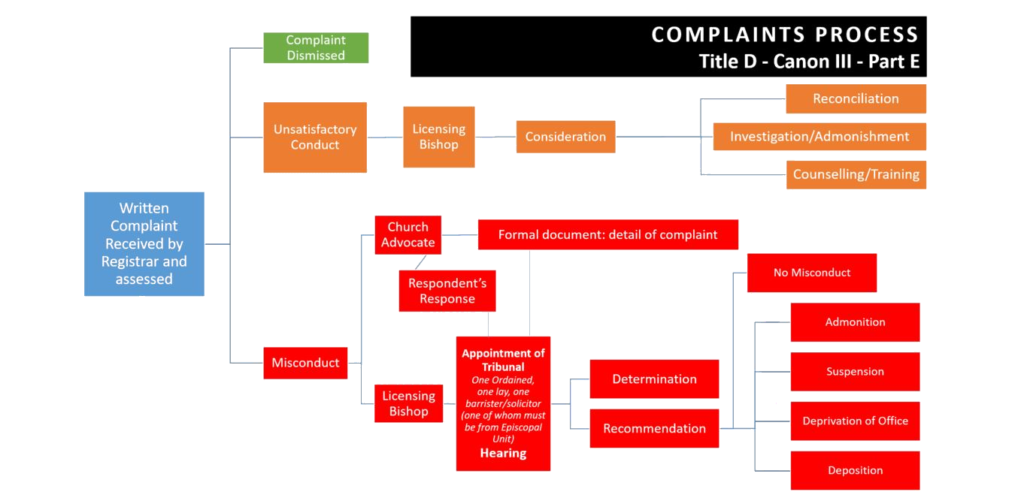The National Complaint Process
This page has been updated to include…
-
the national complaint process that was approved in January 2021
-
a link to the Ministry Standards Commission website that went live in June 2022
This page includes information about:
-
How to make a complaint
-
The Church Canons (the Rules office bearers must follow)

-
Our national Ministry Standards Registrar, including:
-
deciding the level of complaint and
-
the possible outcomes of each level
-
-
A visual process chart
-
A link to the full set of Canons (rules) that govern our Anglican Church
-
And finally, a link to our Safeguarding webpage.
The information below is a summary overview of the complaint process. It is not intended as a detailed description and tries not to use legal jargon. However, some important terminology is explained. The Church rule book, called the Church Canons, is a legal document specifying the way Anglicans do their work. To understand the process in full you will need to take advice and/or read the Canons in full. There is a link to a complete set of Canons at the bottom of the page.
Making a Complaint
If you wish to make a complaint about an office bearer in the Anglican Church (for example, a priest, deacon, bishop, licenced lay minister, trustee, etc) we encourage you to put it in writing and send it directly to the independent Registrar, either by email or post.
Ministry Standards Registrar c/- P O Box 87188,Meadowbank, Auckland 1742
registrar@anglicanchurch.org.nz
To read more about the Ministry Standards Commission and how they work, go to www.ministrystandards.org
Church Canons, or rules, concerning complaints
In January 2021, the Anglican Church in Aotearoa New Zealand and Polynesia introduced a new set of canons (rules) that describe the standards expected of office bearers in the church along with the complaints process that makes office bearers accountable.
The new Canons ensure people experience the Anglican Church as a place of love, of wholeness and of safety [Archbishop Philip Richardson].
The third Canon (Canon III of the Maintenance of Ministry Standards) describes the way that complaints are received, assessed, determined and made public.
All complaints are sent to the Registrar who will determine what happens next. No complaints are to be vetted by any diocesan office bearer. That means that any representative of the church who receives a complaint, is obliged to forward that complaint directly to the Registrar.
What follows below is not intended as a detailed evaluation or description of the canonical process but is instead a simple summary. To understand the process in full you will need to take advice and/or read the Canons in full.
Ministry Standards Registrar and process
The Ministry Standards Registrar is appointed by the Ministry Standards Commission.
[To read more about the Ministry Standards Commission please go to their website: www.ministrystandards.org]
The current Ministry Standards Registrar is a retired judge, the Hon. Dr John Priestley QC.
- The MS Registrar must be enrolled as a barrister or solicitor of the High Court of New Zealand and have at least 7 years’ experience.
- You can read the MS Registrar’s judge profile here: www.kiwisfirst.com
- The MS Registrar is responsible for completing the initial assessment of each complaint received.
- The MS Registrar will then decide whether the complaint should be dismissed or referred as either unsatisfactory conduct or misconduct.
Unsatisfactory Conduct
“a failure to observe Standards Required of Ministers which does not amount to misconduct”
Any complaint that is determined “unsatisfactory” will be referred back to the relevant bishop. (If the complaint concerns a bishop then the Registrar refers to the appropriate archbishop.) The bishop, or archbishop, then has the following courses of conduct available:
(a) a process of reconciliation carried out in accordance with the principles of the relevant Tikanga;
(b) a full investigation into the complaint, following inquiry principles, after which the bishop (or archbishop) may admonish the office bearer; and/or
(c) requiring the office bearer to undertake further training or counselling.
Misconduct
“any intentional, significant or continuing departure from the Standards of Ministry set out in Canon I”
Any complaint that the Registrar considers to cross the threshold defined above will be described as ‘misconduct’ and referred for further investigation and a tribunal hearing. The complainant is not expected to prosecute his or her own case. Instead, the church appoints an advocate to prosecute on behalf of the complainant. This advocate must be a barrister or solicitor of the High Court of New Zealand and must have at least 7 years- experience. Likewise, the office bearer (also called the respondent, the persons against whom the allegations are made) are not expected to defend themselves.
A tribunal will determine whether there is misconduct or not and make appropriate recommendations. Where there is no evidence of misconduct the complaint will be dismissed. If there is evidence of misconduct, then one of four recommendations will be made in the following order of seriousness:
-
- Admonition
- Suspension
- Deprivation of Office
- Deposition
The Complaint Process
The chart below describes the process in broad terms.

Title D, Canon III
- To understand the process in full, please refer to Title D, Canon III.
- You can read these rules in full here: Title D Canons (scroll down to Title D once you get there).
- Alternatively you can read about the Canons on the Ministry Standards Commission website.
Safeguarding
The Anglican Church is committed to being a safe place for everyone. This church is committed to establishing safe, caring, Chris-centred communities where the dignity of everyone is respected.
- Please visit our Safeguarding webpage under About Us.
